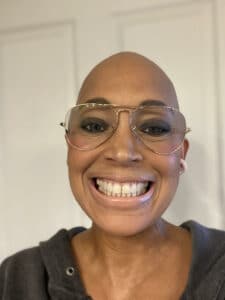“Letting people know about the support that DBSA provides helps me shed any remnants of shame I used to feel about having bipolar disorder.”
“Our nation is facing a mental health crisis among people of all ages, and the COVID-19 pandemic has only made these problems worse,” stated a White House report last year. Still, at a time when the mental health needs of Americans are higher than ever, 77% of U.S. counties face a severe shortage of behavioral health professionals.
For Black Americans seeking culturally relevant care from practitioners with similar experiences, that shortage is even more dire. A 2023 report from Counseling Psychology found that only 4% of American therapists are Black.
Umi experienced this firsthand when she sought mental health care in Auburn, Alabama.
“As a Black person living with a mental health condition, my journey getting mental health care has been challenging,” Umi said.
“It took years for me to actually find a Black therapist and Black psychiatrist, let alone other Black people who weren’t in the profession that I could talk to and connect with.”

DBSA aims to address the gap in access to mental health care by providing peer-led support groups, holding more than 20,000 support group meetings annually. Understanding how cultural context impacts experiences of mental health conditions, DBSA also provides a variety of culture and identity-specific groups, including for the Black community.
When Umi first discovered DBSA, she was excited to join a Black Community support group online, but she also wanted a chance to connect with peers face-to-face. Finding that there were currently no in-person offerings near her, she took matters into her own hands.
“I thought, I need to start my own group! And I read that I could,” Umi said. “I filled out an application to start a Black support group, and the rest is history.”
Now, the Auburn, Alabama, DBSA for Black Wellness Support Group meets every other week, with Umi facilitating meetings out of a local Black Baptist church.
Umi was initially hesitant to approach the church about hosting a support group, conscious of the stigma attached to mental health conditions, but contrary to her initial stereotypes about the Black church, she was welcomed with open arms and even invited to present to the church community.
“It was the first time in my life standing up in front of that many people and telling them I have a mental health condition.”
“I was worried I would be judged or that people would be embarrassed to be seen with me, but people stayed to talk to me afterward,” Umi said. “They said they were thankful that I shared my story. It was incredibly affirming.”
Umi said that one of the biggest barriers to accessing mental health care that she hears about is the cost, with so much of her community dealing with poverty. DBSA support groups are always free and accessible to all, with both in-person and online options. Considering the provider shortage and financial barriers to accessing mental health care, peer support provides an alternative to address the gap.
“They know I’m not a therapist, and that’s what makes people comfortable,” Umi said. “They hear my story, why I needed help, and even why I need this group for myself and my own mental health.
“Letting people know about the support that DBSA provides helps me shed any remnants of shame I used to feel about having bipolar disorder.”
Learn how to join Umi’s group or find DBSA’s other support group offerings.


